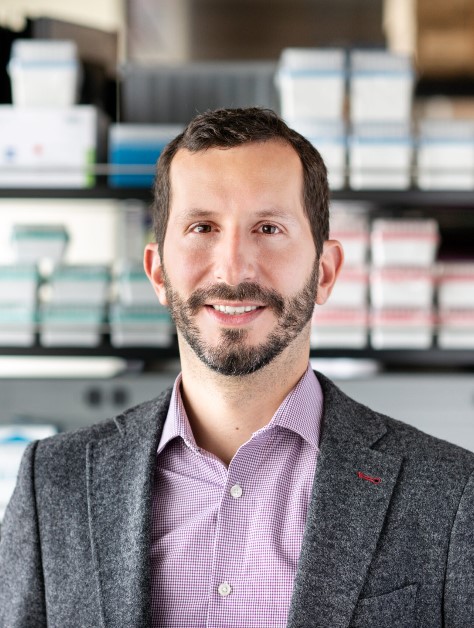
Michael Alexanian, PhD
Heart disease is a global epidemic, responsible for 1 in every 5 deaths in the U.S. In many diseases, stress-activated signaling pathways trigger chromatin rewiring, activating pathological gene expression that contributes to progressive organ dysfunction. Our lab explores how chromatin receives, processes, and amplifies stress signals that drive changes in cell states, leading to inflammatory and fibrotic diseases, such as heart failure.
The Alexanian lab employs a range of advanced tools and techniques, including single-cell genomics, whole-organ in vivo physiology, murine genetic models, CRISPR screens, computational biology, and stem cell-derived models of cardiomyocytes, cardiac fibroblasts, and macrophages. These human-induced pluripotent stem cell (iPSC)-derived models enable us to study cell behavior and molecular mechanisms in a context that is directly relevant to human biology. Our recent research has uncovered the mechanism behind the beneficial effects of small-molecule bromodomain inhibitors in heart failure. We found that these drugs do not directly affect cardiomyocytes but instead regulate the activation of fibroblasts and macrophages, ultimately impacting cardiac function. These studies have revealed novel molecular pathways critical for controlling stress-induced fibroblast activation and the crosstalk between inflammation and fibrosis.
Our ongoing research explores the pathogenesis of heart failure from a cell-to-cell communication perspective, using iPSC-derived models to gain deeper insights into the signaling molecules that regulate interactions between stromal, muscle, immune, and vascular cells. By uncovering the molecular mechanisms driving this crosstalk, we aim to uncover new therapeutic strategies for chronic diseases that involve maladaptive tissue remodeling, such as heart failure.
Ultimately, our goal is to contribute to the development of targeted therapies that modulate gene regulation in a cell-specific manner to treat human diseases. The major research goals of our laboratory are:
-
Investigate the molecular mechanisms driving dynamic changes in cell states during cardiovascular disease.
-
Define the crosstalk between stromal, muscle, immune, and vascular cells in cardiovascular disease.
-
Develop strategies to therapeutically target maladaptive cell states in diseases with pathological tissue remodeling, such as heart failure.
Featured Publications
Chromatin Remodeling Drives Immune-Fibroblast Crosstalk in Heart Failure Pathogenesis
Michael Alexanian#,*, Arun Padmanabhan*, Tomohiro Nishino, Joshua G. Travers, Lin Ye, Angelo Pelonero, Clara Youngna Lee, Nandhini Sadagopan, Yu Huang, Kirsten Auclair, Ada Zhu, Yuqian An, Christina A. Ekstrand, Cassandra Martinez, Barbara Gonzalez Teran, Will R. Flanigan, Charis Kee-Seon Kim, Koya Lumbao-Conradson, Zachary Gardner, Li Li, Mauro W. Costa, Rajan Jain, Israel Charo, Alexis J. Combes, Saptarsi M. Haldar, Katherine S. Pollard, Ronald J. Vagnozzi, Timothy A. McKinsey, Pawel F. Przytycki & Deepak Srivastava
(#Sole corresponding author) (*co-first authors)
Nature, 2024 (Link to manuscript)
Transcriptional plasticity of fibroblasts in heart disease
Rudi Micheletti and Michael Alexanian#
#Denotes corresponding author
Biochemical Society Transactions, 2022
A Transcriptional Switch Governs Fibroblast Activation in Heart Disease
Michael Alexanian, Pawel F Przytycki, Rudi Micheletti, Arun Padmanabhan, Lin Ye, Joshua G Travers, Barbara Gonzalez Teran, Qiming Duan, Sanjeev S Ranade, Franco Felix, Ricardo Linares-Saldana, Yu Huang, Gaia Andreoletti, Jin Yang, Kathryn N Ivey, Rajan Jain, Timothy A McKinsey, Michael G Rosenfeld, Casey Gifford, Katherine S Pollard, Saptarsi M Haldar, Deepak Srivastava
Nature, 2021=
BRD4 (Bromodomain-Containing Protein 4) Interacts with GATA4 (GATA Binding Protein 4) to Govern Mitochondrial Homeostasis in Adult Cardiomyocytes
Arun Padmanabhan#, Michael Alexanian#, Ricardo Linares-Saldana#, Bárbara González-Terán, Gaia Andreoletti, Yu Huang, Andrew J Connolly, Wonho Kim, Austin Hsu, Qiming Duan, Sarah AB Winchester, Franco Felix, Juan A Perez-Bermejo, Qiaohong Wang, Li Li, Parisha P Shah, Saptarsi M Haldar, Rajan Jain, Deepak Srivastava
#Denotes shared co-first authorship
Circulation, 2020
A transcribed enhancer dictates mesendoderm specification in pluripotency
Michael Alexanian, Daniel Maric, Stephen P Jenkinson, Marco Mina, Clayton E Friedman, Ching-Chia Ting, Rudi Micheletti, Isabelle Plaisance, Mohamed Nemir, Damien Maison, Jasmin Kernen, Iole Pezzuto, Dominic Villeneuve, Frédéric Burdet, Mark Ibberson, Stephen L Leib, Nathan J Palpant, Nouria Hernandez, Samir Ounzain, Thierry Pedrazzini
Nature communications, 2017
